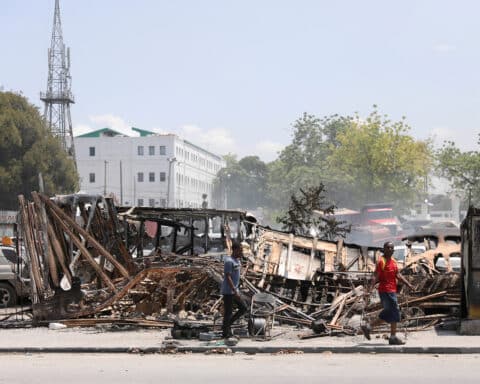Skeletons in closets. In early July, Cardinal Reinhard Marx, the archbishop of Munich, acknowledged, and asked forgiveness for, the conduct of deceased Auxiliary Bishop of Munich Matthias Defregger, who died in 1995.
The bishop was an officer in the German army during the Second World War, when the army invaded Italy shortly after the Italian government canceled its alliance with Germany and, for all practical purposes, surrendered to the Allies — the United States, Britain and the others.
The Italians did not exactly welcome the invading Germans with open arms. Underground efforts, some coincidentally, led by Catholic bishops, priests, religious and laity, tried to frustrate the invasion with sabotage, hiding Jews — since a major part of the German policy was to annihilate every Jew alive — and protecting American and British soldiers caught in enemy territory.
Obviously, these efforts enraged the Germans and complicated German plans. To show that they meant business, the Germans invoked a tactic used throughout lands that they occupied. German troops would sweep unannounced, of course, into a place, gather all the people together, kill them and burn everything to the ground. In one French village, Oradour-sur-Glane — its ruins now a national memorial in France — the Germans locked the women and children in the church and set the church on fire. They ruthlessly machine gunned all the men in a field. Near the Vatican, ordinary Romans simply were walking down the street at the wrong time. German soldiers got them all.
Captain Defregger oversaw the destruction of Filetto di Camarda, a village in central Italy. Innocent civilians were slaughtered. After the war, he went home, became a priest and then a bishop. A war crimes court cleared him, the statute of limitations applying. Cardinal Marx insisted, nevertheless, that the bishop was guilty.
Arguing the Defregger case is not the point. The bishop is dead. The slaughtered victims in Filetto cannot be returned to life. Still, this event shows how terrifying human behavior can be when God, and God’s moral law, are ignored, and how people may react, for the worst, when pushed into the corner.
In the mid-1930s, the German people were desperate and afraid. The economy was collapsing. Overwhelmingly, admittedly with exceptions, they allowed themselves to be sucked into accepting without question a godless philosophy of life, hoping to end their problems. They looked for people to blame. Jews! Anyone with another opinion was an enemy.
People can be afraid and desperate in matters much smaller than national policy.
A flippant cliche asks this question, “What would Jesus do?” While trivial, it makes a good point. We Catholics should ask this question in making decisions great or small. In personal relationships, and in judging major social problems, the question has proven validity.
Problems may be real, complicated and hard to resolve, granted, but morally, no end, however a relief or a perceived good, justifies immoral means. Maintaining law and order is no excuse for brutalizing suspected criminals. Hastening the war’s end did not justify killing hundreds of thousands of Japanese with nuclear bombs in 1945.
Immigration from abroad supplies a modern example. More than a few Americans are perplexed, some afraid, hearing about people — the vast majority of whom never committed a crime and who often are victims of evil back home — wanting a better life, entering this country.
The Lord reached out to the Samaritan woman at the well when Jews scorned Samaritans, with a reason for the scorn. He rescued the woman caught in adultery. Adultery destroys families and marriages. He welcomed a convicted criminal to heaven. Solve and move ahead from problems. Separate fear from genuine fact.
Russia’s invasion of Ukraine is wrong. The American government is considering sending to the Ukrainians cluster bombs. The Ukrainians are entitled to defend themselves, but cluster bombs raise a serious moral issue: indiscriminate destruction of human life.
What would Jesus do?





